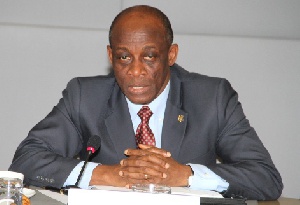Finance Minister Seth Terkper has elaborated the challenging situation Ghana faces due to the rapidly declining Crude oil prices on the World market.
As contained in a statement delivered to the Ghanaian Parliament last week, Mr. Terkper made a case for a review of the 2015 budget because he claims the declining oil prices have derailed the government’s projections of what it was expecting from oil revenues to finance the budget.
According to critics, this situation is expected to put more pressure on the John Dramani Mahama administration which is already saddled with countless economic challenges.
However, the Finance Ministry is upbeat about the prospects of the economy; based on the measures it says it has put in place to counter the gloomy effects of the declining oil revenues.
“The medium term prospects of the economy remain bright. This is supported by expected additional oil and gas production, enhanced services sector performance, and improvements in agriculture, among others. Government will continue to work tirelessly to ensure that these positive prospects, as well as our macroeconomic stability and socio-economic objectives are not derailed by external and domestic shocks,” the statement read.
The Finance Ministry had earlier estimated US$99.38 per barrel for 2015, but currently crude prices are hovering below US$60 per barrel, a situation that will lead to a significant drop in Ghana’s oil revenue; from an estimated Ghc4.2 billion down to Ghc1.5 billion.
“Based on this price assumption, total petroleum receipts for 2015 is estimated at Ghc1.5 billion, compared with the 2015 Budget estimate of Ghc4.2 billion,” the Ministry of Finance said in a statement released recently.
“…a Petroleum Benchmark Revenue (PBR) price of US$99.38 per barrel and a volume of 102,033 barrels per day was estimated in the 2015 Budget,” the statement read.
The Finance Ministry has outlined how these new receipts would be allocated: “Of this amount, Ghc2.5 billion was allocated as Annual Budget Funding Amount (ABFA); Ghc1.1 billion was estimated to be transferred into the Ghana Petroleum Funds, and Ghc697.7 million to the National Oil Company.”
Meanwhile, the Finance Ministry has said it has devised smart ways to offset the shortfall, “ To address the revenue shortfalls noted above and ensure the achievement of the objectives of the ongoing fiscal consolidation, and keep borrowing in line with the levels approved in the 2015 Budget, key measures being implemented include an across the board reduction in expenditure ceilings on Goods and Services and Capital by Ghc344.0 million and Ghc868.4 million, respectively, as well as a drawdown of an amount of Ghc487.2 million from the Ghana Stabilization Fund.”
According to the Finance Ministry, the measures to address the impact of these shocks will yield the intended benefits and ‘significantly contribute to the achievement of our short-to-medium term fiscal consolidation objectives’.
Click to view details



Business News of Tuesday, 17 March 2015
Source: The Republic
Terkper firms control over economy
Entertainment
















